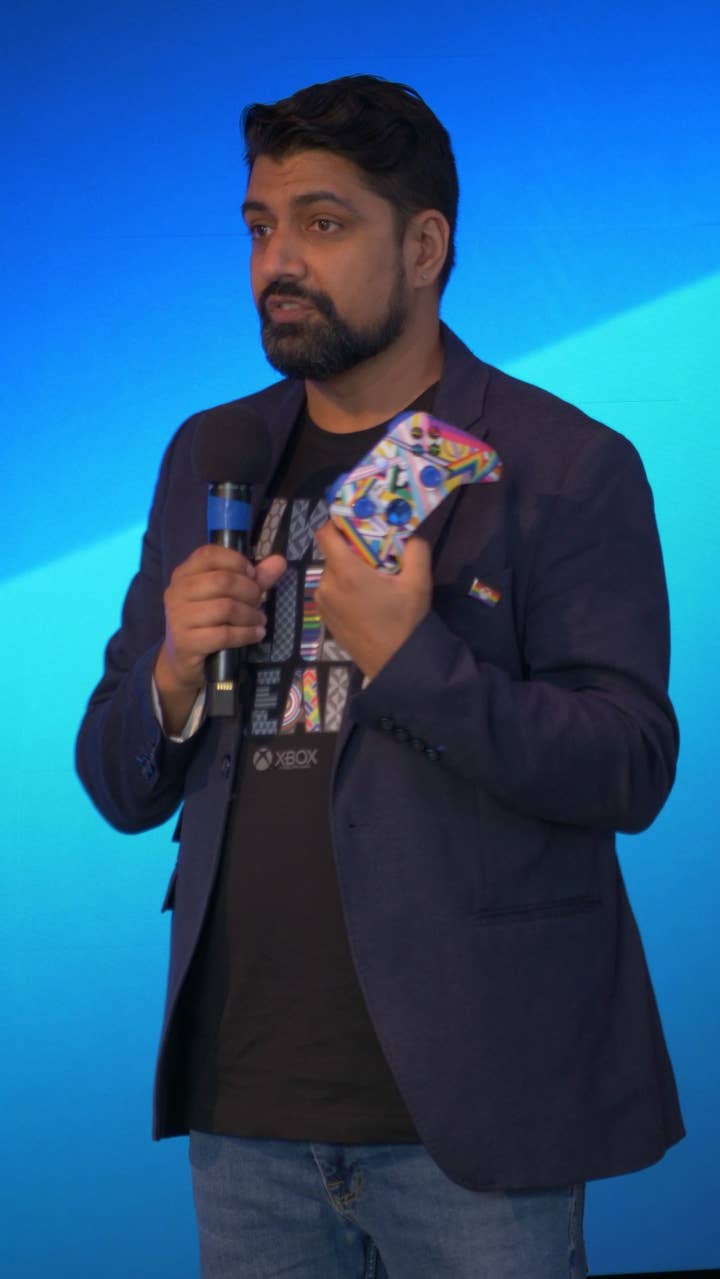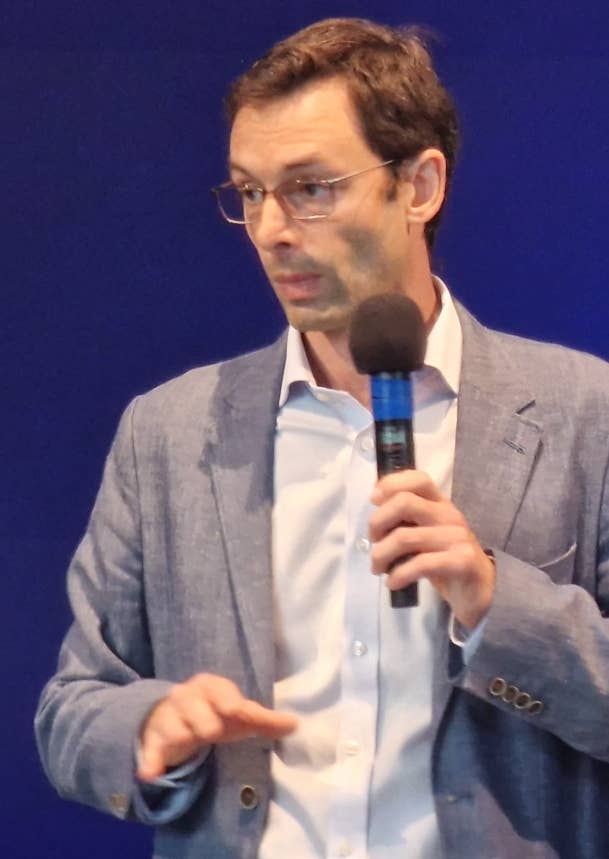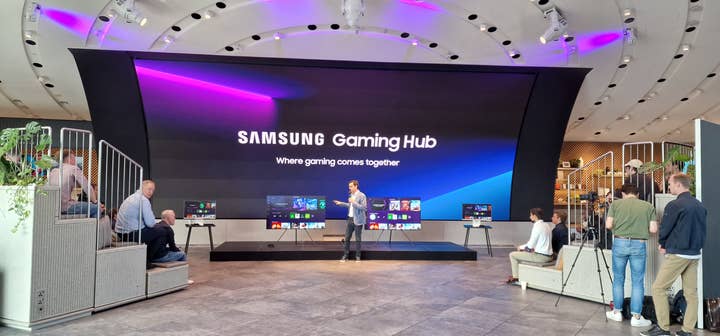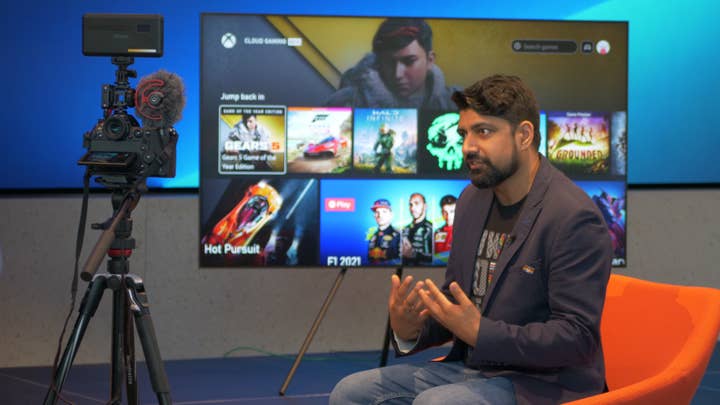Xbox: Cloud gaming is a "great alternative" to console, not a replacement
Samsung and Microsoft tell us how games streaming reached the needed inflection point as they partner on the Samsung Gaming Hub
"No storage limits, no downloads. Just bring your controller."
That's the promise given by the sizzle reel for the Samsung Gaming Hub at its launch event in London on Monday, accompanied by action-packed footage from the likes of Halo Infinite, Forza Horizon 5, Red Dead Redemption 2, Fortnite and more.
The Hub is an area on Samsung's 2022 Smart TVs that offers users access to Microsoft's Xbox Game Pass, Nvidia's GeForce Now, Google's Stadia, Amazon's Luna (only available in the US) and even PC subscription service Utomik, enabling them to stream games via the cloud.
In the communications around it, there are references to unlocking gaming for people without a dedicated device -- but what indication do these companies have that there is enough demand for such a service? Both Microsoft and Sony have repeatedly said that demand for their latest consoles is higher than any previous generation, so surely those who would enjoy the titles shown already own such a device (if not a PlayStation 5 or Xbox Series X|S, then likely one of their forebears)?
"From our side, we know there's three billion gamers out there around the world, and we know we are talking to the vast majority of those customers today," Pav Bhardwaj, senior global product manager at Xbox Game Pass, tells GamesIndustry.biz.

"For us, cloud gaming opens up our product and our service to customers around the world in different markets. There are different reasons why people don't buy dedicated hardware: affordability, accessibility, maybe they're lapsed gamers or already own devices for other platforms. We really think this is about accessibility and choice."
Gus Grimaldi, Samsung Electronic's head of product for Europe, adds: "People who already know all of these AAA games probably already have their console or PC set up. [We want to] open up the ecosystem so you're able to play these games, taking the friction out so you can try the best games out there or maybe games for your kids or some other demographic within your house. You can all have a go and try it out. It's about giving people the choice -- not everybody is a professional gamer."
That's true, but billions of not-professional gamers with any inclination towards gaming almost certainly have a smartphone or tablet. These devices have become ubiquitous in most markets and already offer a wide range of gaming experiences, from casual titles like Candy Crush Saga to AAA equivalents like Apex Legends, Call of Duty Mobile and Genshin Impact (and, prior to Epic's legal crusade, Fortnite). What's more, these are all available for free -- no subscription required, unlike the services found on the Samsung Gaming Hub.
Bhardwaj notes that Xbox Cloud Gaming is already available on phones, too, via the Game Pass app, as well as internet browsers for low-end PCs and iOS.
"For us, this is just an extension and evolution of all the different places you can play," he says.
Grimaldi points to the key difference between mobile devices and smart TVs: "It is not comparable to play a game on a phone or a tablet compared to a full-size screen. This experience is so much nicer, so much better. Being able to offer that to Samsung customers without the friction of having to be an expert on how to get the games, it's amazing for us."
"It's not that one is a detriment to the other, this is more of a rising tide, and it's a really good place to be in to offer all these different opportunities"
Pav Bhardwaj, Xbox
As mentioned, the Samsung Gaming Hub encompasses a variety of streaming services, although the partnership with Xbox certainly dominates the marketing. Sony's own service, PlayStation Now, is absent; when asked whether this might be added at a later date, Grimaldi was unable to comment but adds that Samsung "is always running an open ecosystem."
It's worth remembering that Sony has actually already attempted this. Back in 2014, the platform holder brought its PlayStation Now service -- built on the foundations of Gaikai, which it had acquired for $380 million just two years prior -- to its own line of Bravia TVs. A year later, this was expanded to Samsung TVs as well, but the service was pulled from everything but PlayStation 4 and PC in early 2017.
Since the notion of bringing high-end games to audiences without a console is nothing new, what's different this time around? Bhardwaj emphasises the hard work both Microsoft and Samsung have put in so they can "meet the quality bar that the gamers of today expect"; 1080p, 60 frames per second, the lowest latency -- the usual.
"We had to get the service to that level before we were comfortable with delivering that back out to customers, and to new gamers," he says. "We had to make sure it was an experience they would want to continue doing, and that's where we feel we are now.
"We also wanted to make sure the cloud gaming experience is ubiquitous across our other devices. We didn't want this sub-par service -- if you're going to live up to this promise, you've got to be able to deliver Halo, Forza, all those other great games, at a really great quality with low latency. You need to do that, we weren't going to do anything different."
He continues: "Compared to eight years ago, things have moved on so much in terms of bandwidth, technology... but at the same time, people's expectations have also increased in parallel with that. I think we've got to the inflection point where we can deliver cloud gaming services through Smart TVs in the same way that Disney+ or Netflix is delivered, at that level [of quality] -- and you don't need a console. That's the magic of the experience."
Again, there's the reference to no longer needing dedicated hardware. As shown by the media streaming services Bhardwaj mentions, other forms of entertainment have long since escaped the need for dedicated hardware: films and TV programmes can be experienced in just the same way, whether it's via mobile, tablet, set top box, smart TV or internet browser. It has been much harder to break video games away from their traditional devices.

Executives, developers and industry pundits have been predicting a world without consoles for years -- at least ten years, in fact. Google's opening gambit for Stadia was that the next generation of gaming wasn't limited to a box. Yet consoles persist and, as mentioned earlier, demand for Xbox Series X|S and PlayStation 5 suggest they're not going anywhere any time soon. Will the rise of cloud gaming services fuel the fire behind these age-old predictions, reviving the notion of as console-less future?
"Some people are always going to love playing on consoles, having a console in their living room to download and have that experience," Bhardwaj acknowledges. "I love consoles -- this is just another route, another option to open up gaming to other people. It's not that one is a detriment to the other, this is more of a rising tide, and it's a really good place to be in to offer all these different opportunities. There's still PC, and there'll be new form factors that come out in future.
"Consoles are beloved, and cloud gaming is just a great alternative."
While streaming has irreversibly disrupted the other entertainment sectors, games are likely to always remain something of an outlier. The mainstream audience engages with the products of this industry to those of other media; a Netflix subscriber is likely to watch dozens upon dozens of films and TV series over the course of a year, whereas mainstream gamers -- and even much of the core audience -- will only engage with a handful (especially if they prefer hugely popular multiplayer games like Fortnite, FIFA or Call of Duty).
"[We want to] open up the ecosystem, taking the friction out... It's about giving people the choice -- not everybody is a professional gamer"
Gus Grimaldi, Samsung
It's an additional challenge for any company running a subscription-based service centred around offering a vast and continually expanded library of games. But, as you would expect given how much Microsoft has shifted its gaming business towards this model, Bhardwaj is optimistic.
"If you do the maths on buying two or three games per year, I think there's an equivalent in the annual subscription charge," he says.
"There's also an element of being introduced to genres of games that you would never have played before, because you would never have purchased them. When you have a catalogue of hundreds, you're constantly exposed to new types of games, and there's a community element as well where your friends are playing certain types of games you might not have played."
Grimaldi adds: "It's about the search and discovery experience. The Gaming Hub gives you the option to look at all sorts of games, regardless of what you want to play... we can surface that all the way to the top so people can play games, discover new games, without having to understand the whole gaming ecosystem. The Gaming Hub brings all things gaming together to help with that discovery and search, similar to what we do with the 'media' section of our TVs, collecting all the apps like Disney+, Netflix and Amazon Prime video together."
He adds: "It's only natural that we start bringing all of these experiences that you already have on the media services over to gaming."

On the notion of discoverability, and circling back to the nature of cloud gaming itself, there's one last factor that stands in its favour -- and it harks back to Bhardwaj's comments about cloud and console being complimentary. While the latter offers the superior experience in terms of stability and crystal clear graphics, the former is much more accessible.
Downloading a game for console or PC, even one you've gained access to for no additional cost via a subscription, takes time. No doubt many a Game Pass user has spent hours waiting for a title to install, only to play for less than an hour, decide it's not for them and then delete (the question of whether subscriptions make games feel more 'disposable' is one for another time). Whereas cloud gaming enables you to sample a title within minutes; since the feature launched on Xbox, I have certainly used it to gauge whether a game is worth downloading.
With little to no game rentals available (wherefore art thou, Blockbuster?) and very few major new titles shipping demos ahead of launch, could cloud gaming become a key discoverability tool? Bhardwaj certainly thinks so.
"I'm the sort of person who'll find they have half an hour before going out and want to play a game," he says. "Do I sit and wait for something to download, or do I jump into the cloud feature? Being able to jump in and play a brand new game that has launched has been amazing, and I can trial it and if I like it, I'll download it while I go out.
"It's another layer of accessibility in gaming in how quickly you can jump in and play it."

